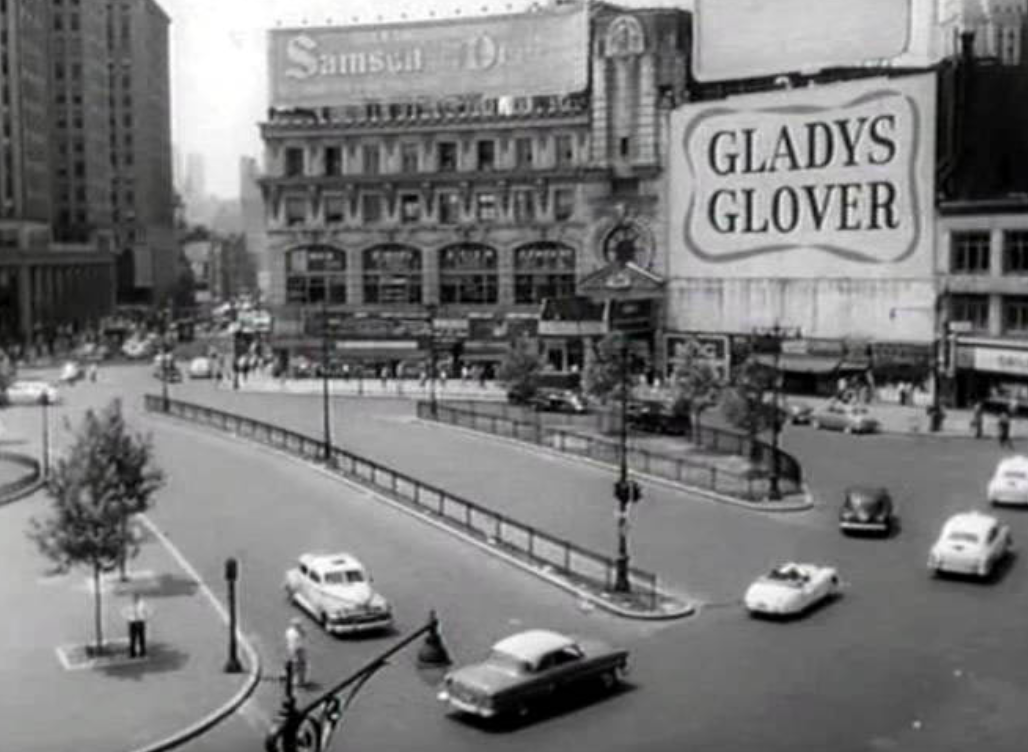The renowned “woman’s director” (that was derisive code for the open Hollywood secret of his sexuality), George Cukor was, by 1954, all too familiar with the desire for and effect of fame, especially on appetitive for admiration and affection starlets. As such, he was an ideal choice to helm It Should Happen to You, with Judy Holliday in the role of daffy, somewhat ditzy (but in a harebrained intelligent à la Lucy Ricardo way) Gladys Glover. Freshly fired from her job as a girdle model for gaining less than an inch, Gladys suddenly finds herself wondering what she’s been doing to make a name for herself as she had always intended after all her time in New York.
Meandering through Central Park barefoot eating peanuts in contemplation about what to do next, an unknown documentarian, Pete Sheppard (Jack Lemmon, in his debut role), becomes fascinated by Gladys’ unusual behavior, including her approach of a man listening to the radio. Irritated by her interruption and offer of peanuts, he decries, “Look, girlie. I don’t mind a pick up once in a while, only I like to do the pickin’ see?” Pete films the entire exchange, eventually accompanying Gladys to a drinking fountain nearby and warmly accepting her offer of peanuts, as well as the story behind her barefoot presence in the park (“I think better without my shoes on”), as well as in New York in general. Though she doesn’t know exactly what she wants to do to make a name for herself, Pete assures her, “If [success is] what you really want, you’ll get it.” When she asks in earnest, “How?”, he replies, “I don’t know. Just a theory of mine: that not only ‘Where there’s a will, there’s a way,’ but, ‘Where’s there’s a way, there’s a will.’ See?” She doesn’t, quite, until happening upon a billboard advertising available space in Columbus Circle–prime visibility for whatever might be showcased. As Gladys stares at it, the lightbulb in her head goes off: using all of her savings to pay for the billboard that will bear her name: GLADYS GLOVER. No explanation, no image, no tag line. When she goes to the office to inquire about purchasing the space for a rate of $210 a month (which, of course, sounds extremely reasonable by today’s price expectations), the account manager responsible for it is immediately perplexed, asking her what, precisely, she’s advertising. Gladys plainly explains that it’s herself she’s advertising. So it is that her character essentially innovates the modern concept of being a fame-seeking whore at any literal price.
When Adams Soap, owned by Evan Adams III (Peter Lawford, known for more than just being married to Patricia Kennedy), discovers that their usual ad space has been abruptly rented, the Pfeiffer Company–which Adams Soap buys the billboard real estate from–calls Gladys to a meeting with Evan in attendance. Imploring her to reconsider and give back the billboard with the offer of a full refund and a $500 bonus, Gladys refuses. This is her dream, after all, nebulous as it may be, and she’s not surrendering it to anyone. Not after having it at last in her grasp after so much previous time wasted as a nobody.
Gladys’ elation over passing by her name every time is just one of the techniques wielded in Garson Kanin’s prescient script, consistently touching on the ways in which people are willing to turn their comfortableness with self-exploitation into a form of freakdom, pandering to cameras and crowds in any fashion they can to get the desired attention and sustained “popularity” (though popular for what, still no one can be sure of). From the moment Gladys receives her first wave of recognition at that hub of all things middling and base–Macy’s–merely because she tells the salesperson her name is Gladys Glover–the anonymous name is at last given a face, and there can be no stopping the runaway train. The excitement of the salesperson spreads to everyone else, simply because of the mob mentality of frenzied behavior exhibited for no valid reason.
Soon after, a new deal struck between Gladys and the Pfeiffer Company gives her six more billboards in prominent locations in exchange for her surrender of the Columbus Circle location. In the meantime, her love life has burgeoned as well, with Pete “just happening” to move in to her building, in the apartment right across the hall from her, and Evan pursuing her with avid interest. To this point, the scene in Evan’s apartment during which Gladys assumes he wasn’t lying about wanting to discuss her career is especially salient in the current climate of sexual assault revelations.
Reconciling with herself what it is Evan really wants, Gladys informs him, “The way it looks to me, Mr. Adams, there are two kinds of people. The ones who would do anything to make a name for themselves and the ones who would do almost anything.” And it isn’t just that It Should Happen To You predicted the extent of how far people would go to see their name in literal big block letters and how inane fame could become, but also the specific way in which people with no talent can enlist a media blitzkrieg in New York if they have the means to do so.
In terms of cinematic prophecies, one could say It Should Happen to You was something of a precursor to It Could Happen to You, which emphasizes the intermingled abstractions of wealth and fame–in short, being famous for having money, like the Hiltons and the Kardashians. In both films, at least, there is the moral that each concept–the one feeding off the other to breed a mutant existence–can never be as fulfilling and rewarding as being what Pete would call “one of the crowd.” However, one has to wonder if, in today’s hyper democratized world of internet notoriety, the message would remain the same in a similarly themed movie.




















